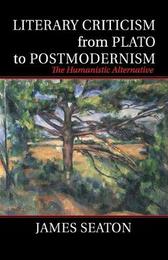
|
Literary Criticism from Plato to Postmodernism: The Humanistic Alternative
Paperback / softback
Main Details
| Title |
Literary Criticism from Plato to Postmodernism: The Humanistic Alternative
|
| Authors and Contributors |
By (author) James Seaton
|
| Physical Properties |
| Format:Paperback / softback | | Pages:236 | | Dimensions(mm): Height 218,Width 142 |
|
| Category/Genre | Literary theory
Literary studies - general
Social and political philosophy |
|---|
| ISBN/Barcode |
9781107514935
|
| Classifications | Dewey:801.95 |
|---|
| Audience | | Professional & Vocational | |
|---|
| Illustrations |
Worked examples or Exercises
|
|
Publishing Details |
| Publisher |
Cambridge University Press
|
| Imprint |
Cambridge University Press
|
| Publication Date |
10 March 2016 |
| Publication Country |
United Kingdom
|
Description
This book offers a history of literary criticism from Plato to the present, arguing that this history can best be seen as a dialogue among three traditions - the Platonic, Neoplatonic, and the humanistic, originated by Aristotle. There are many histories of literary criticism, but this is the first to clarify our understanding of the many seemingly incommensurable approaches employed over the centuries by reference to the three traditions. Making its case by careful analyses of individual critics, the book argues for the relevance of the humanistic tradition in the twenty-first century and beyond.
Author Biography
James Seaton is a Professor in the Department of English at Michigan State University, where he teaches courses on the history of literary criticism, American literature and culture, and literature and law. His previous books include Cultural Conservatism, Political Liberalism: From Criticism to Cultural Studies (1996) and A Reading of Vergil's Georgics (1983). He is the editor of The Genteel Tradition and Character and Opinion in the United States by George Santayana (2009) and co-editor with William K. Buckley of Beyond Cheering and Bashing: New Perspectives on The Closing of the American Mind (1992). Seaton's articles and reviews have appeared in such publications as The Wall Street Journal, The Weekly Standard, The Claremont Review of Books, The American Scholar, The Hudson Review, The University Bookman, Modern Age, Journal of the History of Ideas, Society, The Review of Metaphysics, the Yale Journal of Law and the Humanities, Legal Studies Forum, Cardozo Studies in Law and Literature, and Michigan State Law Review.
Reviews'James Seaton is the only writer discussing the humanist tradition who has sufficient depth of learning to take it back to its origins in Plato and Aristotle. He has shown more clearly than anyone else the paradox of postmodernist theory that nothing can be certain except the postmodernists' own certainty that nothing is certain. This book is sui generis because he offers a practical alternative to the current reign of 'theory' and 'cultural studies'. His characteristic virtues as an essayist and literary critic - discrimination, undogmatic flexibility and vast learning - come through with great force in this book. Seaton is a writer deserving - no, demanding - serious attention.' Edward Alexander, University of Washington 'This book discusses one of the most pressing issues besetting literary studies in higher education - the disengagement of the field from the cultural norms and interests of the American public. James Seaton approaches the issue in a scholarly manner, outlining two intellectual traditions that relate to the trend. The first charts a progressive disconnection of the literary critic from the reading public, and Seaton assigns it significant blame for the sliding fortunes of literary studies. The second exemplifies humanistic inquiry that takes literature as a special cultural object, incorporating theory but striving to integrate it into discourse that is accessible to educated laypersons while aiming to communicate with general readers and align intellectual values with bourgeois values. Seaton aims to steer literary scholars and teachers away from the first lineage and toward the second. We need this argument.' Mark Bauerlein, Emory University, Atlanta '... [Seaton's] take on the recent history of literary criticism returns important voices to the conversation. He also issues a timely call for well-written literary criticism ...' Steven Knepper, The Hedgehog Review '... profound and crisply written ... Seaton builds a strong case for humanism, and it is all the stronger because he follows his own rule of academic integrity.' Gary Saul Morson, The New Criterion '... a much-needed reassessment of the two major traditions of Western literary criticism. ... [it] is among the most thoughtful and informed recent assessments of the present state of literary criticism ... one can only express deep appreciation for the author's painstaking efforts. ... Seaton has produced a superb analysis of some of the most pressing of critical issues. ... It is a book that has much to offer to all students of the humanities.' Jeffrey Folks, Modern Age '... Seaton can turn a phrase with the best of them ... [he has] his own unique style that remains as accessible to the educated layperson as it is to professional scholars of literature. ... Held to his own high standards, Seaton succeeds: his chapters force you to consider what role literature has played in your own development, and how that role might play out in the lives of others.' Allen Mendenhall, The University Bookman
|